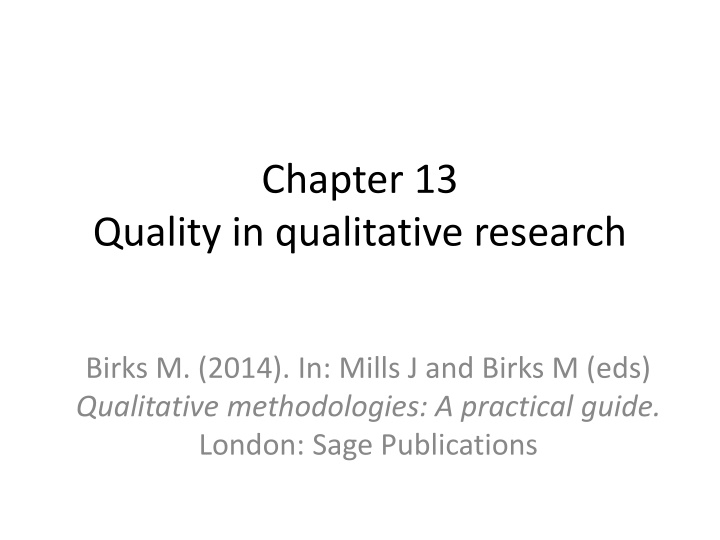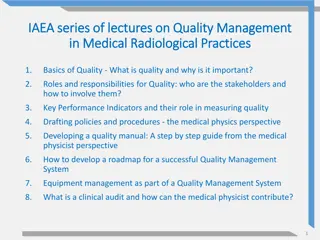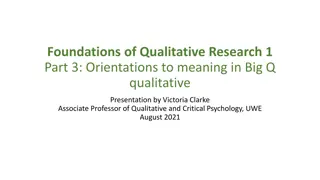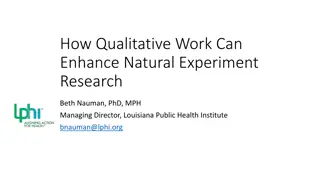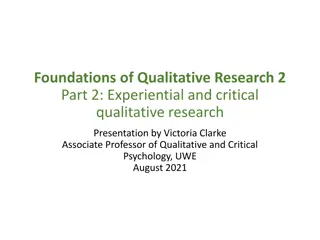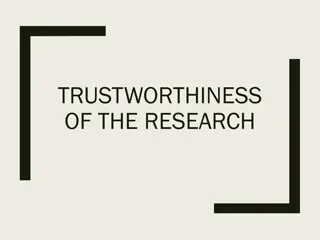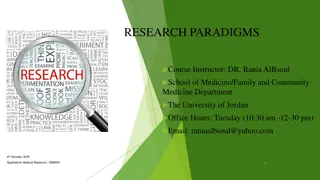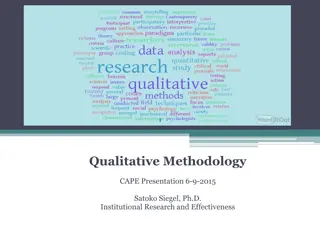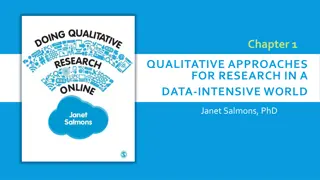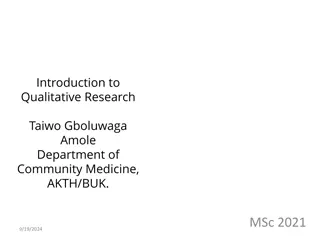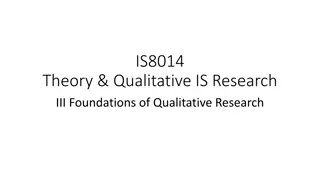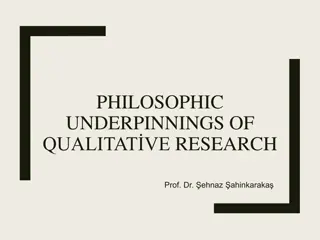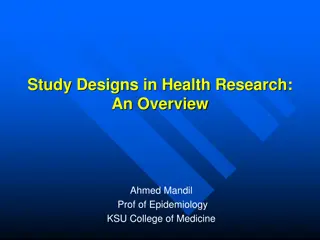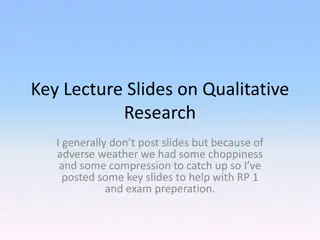Quality in Qualitative Research: Defining and Evaluating Studies
This content explores the concept of quality in qualitative research, discussing debates on evaluating research studies, the importance of rigor, and the influence of positivist perspectives on research outcomes. Learn about current debates, factors influencing quality, and conducting evaluations in qualitative research.
Download Presentation

Please find below an Image/Link to download the presentation.
The content on the website is provided AS IS for your information and personal use only. It may not be sold, licensed, or shared on other websites without obtaining consent from the author.If you encounter any issues during the download, it is possible that the publisher has removed the file from their server.
You are allowed to download the files provided on this website for personal or commercial use, subject to the condition that they are used lawfully. All files are the property of their respective owners.
The content on the website is provided AS IS for your information and personal use only. It may not be sold, licensed, or shared on other websites without obtaining consent from the author.
E N D
Presentation Transcript
Chapter 13 Quality in qualitative research Birks M. (2014). In: Mills J and Birks M (eds) Qualitative methodologies: A practical guide. London: Sage Publications
Learning objectives Define the concept of quality in relation to qualitative research Outline current debates in respect of what constitutes quality in research Identify factors that influence quality in the conduct of your own study Conduct an evaluation of a qualitative research study
Introduction Intent of research is to produce findings that will make a contribution to knowledge & a difference to relevant area of discipline Research should be credible Quality in processes and products What constitutes quality?
Quality in qualitative research: Defining quality In the context of research, quality = rigor Control of the research processes you use will enable you to accommodate or explain factors that impact on the value of your research Be rigorous in conducting your study to produce a credible piece of research
Quality in qualitative research: Current debates Evaluating research studies is generally based on published articles and summary reports Guidelines for critiquing quantitative studies Long standing debate over how qualitative research can and should be evaluated
Quality in qualitative research: Current debates Positivist position contends that research outcomes are accurate only if study situations, methods and processes are rigidly controlled Central to the issue of control is validity and reliability Rigidity of control measures will determine extent of reliability on research results
Quality in qualitative research: Current debates Level of evidence tables often used Value of research within tables is often determined by the research question rather than the methodology Suggestion that quantitative methods are superior because they address issues of validity and reliability
Quality in qualitative research: Current debates Criteria for evaluating qualitative research often appears simplistic, resulting in poor application, leading to unsystematic results and a perception that qualitative research lacks rigor Tendency to make straight comparison between qualitative data and quantitative data
Quality in qualitative research: Current debates
Factors influencing quality Methodological congruence Researcher expertise Procedural precision Quality research (Birks and Mills, 2011)
Factors influencing quality: Researcher expertise Experiential knowledge makes an important contribution Generic skills such as scholarly writing, accessing resources, the ability to project manage Acquiring knowledge about your chosen methodology from conceptualization to completion
Factors influencing quality: Researcher expertise Read extensively Engage with references included in chapters in Section II of the textbook (Mills and Birks, 2014) Explore other opportunities to increase your knowledge, skills and understanding of qualitative research methodologies i.e. qualitative research workshops, conferences, seminars, online forums, mailing lists
Factors influencing quality: Researcher expertise Conditions that foster quality in research: Self-awareness Clarity of purpose Commitment to hard work Internal motivation (Corbin and Strauss, 2008)
Factors influencing quality: Researcher expertise Manage your research study as a project Appreciate the importance of your study An affinity for the topic area Commitment to achieving quality outcomes
Factors influencing quality: Methodological congruence Occurs when there is accordance between: your personal philosophical position stated aims of your research methodological approach used to achieve aims
Factors influencing quality: Methodological congruence Alignment of research design & conduct of study with the study s foundational framework and goals Foundation of credible research Enables you to take risks, be creative and break new ground (Tracy, 2010)
Factors influencing quality: Methodological congruence Invest time prior to commencing your research study Demonstrate consistency with your approach Be honest about the limitations of your study Acknowledge and address methodological inconsistencies as they arise Be attentive to detail
Factors influencing quality: Procedural precision Refers to deliberate, planned and consistent application of methodological strategies Pay attention to: maintaining an audit trail, managing data and resources, demonstrating procedural logic Audit trail provides a mechanism for recording decisions you make in relation to your research
Factors influencing quality: Procedural precision Record events and decisions through the use of a logbook, diary, electronic file or memos During planning stage make decisions about data management that include recording, storing, retrieving, analyzing and reviewing data Software programs are available
Factors influencing quality: Procedural precision Data management systems are tools How you use selected tools is more important than which tools you use and will determine the effectiveness of your data management procedures Establish a logical and secure system
Factors influencing quality: Procedural precision Preserve procedural logic by constantly returning to your original data to ensure that conceptual leaps can be supported by your analysis Establishing and maintaining systematic processes is an investment in credibility
Evaluation of qualitative research Using criteria for evaluating quantitative studies is not recommended Guidelines that address the specifics of each qualitative methodology is impractical Criteria that has broad application for evaluating qualitative studies is beneficial
Criteria for evaluation: Traditional criteria Criteria for establishing that a study demonstrates trustworthiness are: truth value applicability consistency neutrality (Lincoln and Guba, 1985) Criteria align with concepts for evaluating positivist research
Criteria for evaluation Comparison of evaluation criteria terminology (adapted from Murphy and Yielder, 2010) Qualitative criteria Credibility Transferability Dependability Confirmability Quantitative criteria Internal validity External validity Reliability Objectivity
Criteria for evaluation: Contemporary criteria View that prescriptive criteria are antithetical to qualitative research Rigid criteria often used by funding bodies, ethics committees and publication review panels Single broad generic framework can be effective if undertaken from the philosophical position of the methodology being used
Criteria for evaluation: Contemporary criteria Numerous evaluation criteria tools available Critical Appraisal Skills Program (CASP) (CASP, 2010) User-friendly for novice researchers Becoming more widely accepted by agencies that oversee conduct and dissemination of research
The CASP tool Consists of initial screening and subsequent detailed questions Evaluation is generally based on information presented in the published work Published work not always fully reflective of the quality of the work Published work often at mercy of publication constraints
The CASP tool CASP Qualitative research checklist items Screening questions 1 Was there a clear statement of the aims of the research? 2 Is a qualitative methodology appropriate? Detailed questions 3 Was the research design appropriate to address the aims of the research? 4 Was the recruitment strategy appropriate to the aims of the research? 5 Were the data collected in a way that addressed the research issue? 6 Has the relationship between the researcher and participants been adequately considered? 7 Have ethical issues been taken into consideration? 8 Was the data analysis sufficiently rigorous? 9 Is there a clear statement of findings? 10 How valuable is the research?
CASP tool: Screening questions Enable prima facie evaluation of a study Prima facie evaluation allows for decision making about how and whether to proceed Enable you to judge the appropriateness of the qualitative design to meet the stated aim
CASP tool: Detailed questions Focus on issues related to: relevance of the methodology ethical considerations validity of processes significance of the research
Summary The concept of quality What constitutes quality Current debates about quality Factors influencing quality CASP
References Birks M and Mills J. (2011) Grounded theory: a practical guide. London: Sage Publications Ltd. CASP. (2010) Critical Appraisal Skills Programme. Available at www.casp-uk.net. Corbin J and Strauss A. (2008) Basics of qualitative research: techniques and procedures for developing grounded theory, Los Angeles: Sage Publications. Lincoln Y and Guba E. (1985) Naturalistic inquiry, Beverly Hills, CA: Sage. Murphy F and Yielder J. (2010) Establishing rigour in qualitative radiography research. Radiography 16: 62-67. Tracy S. (2010) Qualitative quality: Eight "big-tent" criteria for excellent qualitative research. Qualitative inquiry 16: 837-851.
